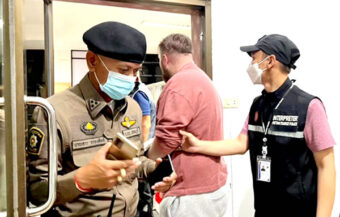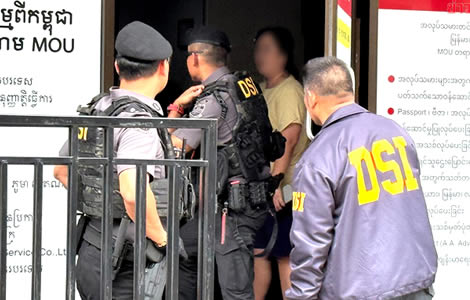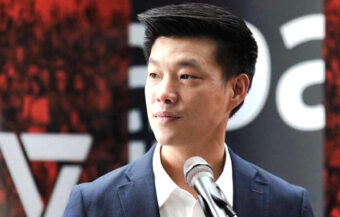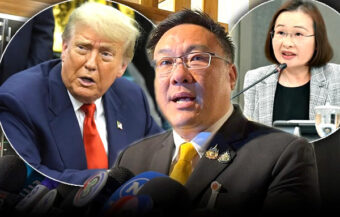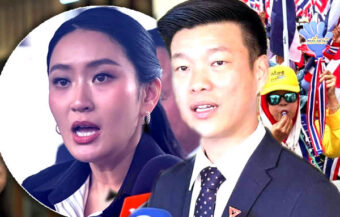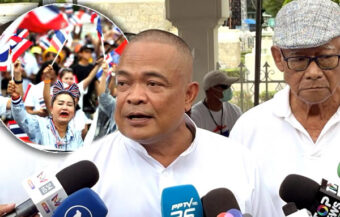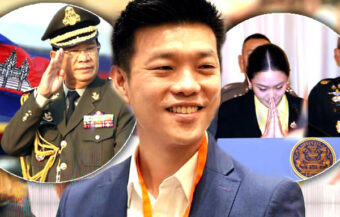The news comes after last Sunday’s execution by Myanmar’s Tatmadaw or military forces of a shop steward at a Chinese owned factory who was demonstrating about underpayment of wages and fought back after a soldier slapped her down. A later demonstration against the terror led to a further five men being gunned down and a media warning from Beijing to Myanmar that ‘drastic action’ may be taken if Chinese nationals in the country and their business interests were not protected after the population in Yangon burned down 32 Chinese owned business concerns causing $37 million worth of damage. The population in Myanmar blame China for undermining the country and supporting the February 1st coup against the government of Aung San Suu Kyi. China, on March 11th, supported a UN resolution condemning the atrocities being committed by the government in Myanmar and calling for restraint from all sides.
As regional tensions in Southeast Asia are on the rise with scores of Chinese factories being burned down by an irate populace in Myanmar, there is growing suspicion in neighbouring countries about China’s invasive Belt and Road initiative camouflaged with lofty rhetoric while the prospect of military confrontation between the People’s Republic of China and the United States over Taiwan continues to grow. Every move now, diplomatically, commercially and militarily by Thailand’s northern neighbour is being examined critically beyond promises of financial advantage. The days of China being a benign engine fostering increased world trade and economic prosperity are long behind us especially after the fallout from the Covid 19 crisis as China bared its teeth, particularly towards Australia. The question that must now be asked is, could Thailand be falling slowly into China’s lap as are other countries in the region?
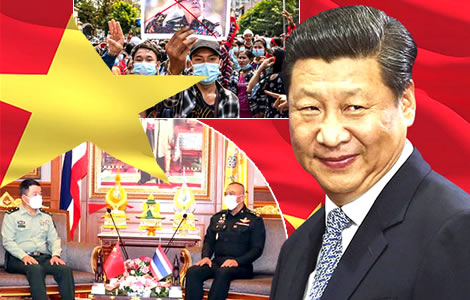
The permanent secretary of the Defence Ministry met the Chinese military attaché from the Chinese Embassy in Bangkok, Major General Wu Xiaoyi on Tuesday at Government House and discussed a project being advanced between Thailand and China to develop an arms maintenance facility that has been in the pipeline for sometime between the two countries.
Amid flourishing rhetoric of friendship between the two nations, the scale of the project was revealed when the Chinese attaché referred to nothing less than the future of Thailand’s defence industry.
Bangkok has long been seen as a regional power in Southeast Asia and continues to deftly manage its relationship between the two great powers of the United States and China.
The question now is, can this still be possible? Or has Thailand already become committed due to its ever-closer relationship with China?
Defence Ministry permanent secretary welcomes ‘unconditional funding support’ towards the kingdoms defence infrastructure from China
At the meeting, General Nat Intaracharoen, the permanent secretary at the Defence Ministry, welcomed what he called the ‘unconditional funding support’ towards the development of Thailand’s future defence infrastructure.
‘We asked the Chinese military attaché to help support Thailand’s plan to develop its defence sector, which is a part of the S-Curve industries that our country wants to promote among foreign investors,’ he explained to the media.
The Chinese attaché also raised the question of further cooperation on a range of military training exercises such as Joint Strike, Blue Strike, Falcon Strike and Cobra Gold.
General Nat, in return, raised the question of sending Thai military personnel to China’s National Defence College for further training.
Fears growing in the region about Chinese expansionist policies which no longer can be ignored
The significant meeting comes at a time when fears are growing regionally about China’s expansionist policies with the most senior US military figure in Southeast Asia saying, in the last week, that a Chinese invasion of Taiwan was a serious prospect at some time during this decade or even before 2027.
This has led to intense scrutiny of the diplomatic activities of the People’s Republic of China especially in the wake of the Covid-19 crisis which appears to have crystallised long-standing suspicion and distrust between western powers and the emerging Asian superpower.
There is also growing concern at the deteriorating security situation in Myanmar where anti-Chinese sentiment has flared up to unprecedented levels as the public, in full revolt against the military junta there, have determined that China is behind the country’s oppressive security forces or military known as the Tatmadaw.
Myanmar people’s revolt becoming more bloody and desperate as factory shop steward is executed
Up to 150 protesters have already been killed by the infamous ‘Tatmadow’ security forces in the country who are now killing at will. They are reported to have executed a workers representative or shop steward at a Chinese owned factory in Yangon on Sunday, March 14th as she led workers protesting at underpayment of their wages by the factory owner.
The shocking incident in the city coincided with no less than 32 Chinese owned factories linked with the textile industry, being torched by an angry population leading to the foreign industry spokesman in Beijing calling on Myanmar’s authorities to protect ‘Chinese institutions and personnel’ in the country.
Chinese media in Beijing estimated the damage inflicted on Chinese interests in Yangon on Sunday at $37 million.
Beijing media warned that ‘drastic action’ might have to be taken to protect Chinese interest in Myanmar
The escalating situation in Myanmar has even led to a warning from the media in Beijing warning that China may be required to take ‘drastic action’ to protect its citizens and their interests if the lawlessness is allowed to continue.
Richard Horsey is a well-known analyst and observer of events in Myanmar.
This week, he was quoted by the Bangkok Post as saying China is essentially disinterested in who holds power in Myanmar but is growing increasingly worried about the situation that is developing there.
Days before the incident in Yangon, on March 11th, China surprised many observers by supporting a motion before the council condemning the violence being used by Mynamar authorities on the protesters.
March 14th atrocity happened the Chinese Xing Jia factory in the Hlaing Tharyar township of Yangon
The March 14th execution of a factory worker’s representative happened in the Hlaing Tharyar township of Yangon when workers at the Chinese owned Xing Jia factory marched on the premises after they claimed to have been underpaid in their wages.
The Chinese owner and manager called in the police and security forces.
During the ensuing confusion and fracas as workers turned on the unpopular military, a woman leading the workers was beaten to the ground by soldiers. The unarmed woman then rose up to tackle them and was executed in cold blood.
‘The soldiers and police came into the factory and surrounded it. The police slapped a girl who was the leader of the workers. When she hit back, they shot her,’ was how one local described what happened.
Demonstration saw five more protesters shot dead as democracy protesters blame China for interfering in the country’s affairs since independence
Reports from the area suggest that a demonstration called to protest the death of the woman led to a further five locals being shot dead, all of them men.
Reports from Myanmar suggest that the population across the country have formed a conviction that Chinese authorities were complicit in the February 1st coup.
There is also growing anger at the extent of Chinese involvement in the economy and interference in the country’s affairs which has been heightened by the Chinese Belt and Roads project which is, of late, linked with an oil pipeline through the country and a deep seaport.
Chinese backed militias including those protecting infamous drug cartels which also target Thailand
The public in Myanmar is also well aware of the long-standing involvement of China in the militias to the north of the country which have long destabilised the state since independence, with a string of autonomous self-governing statelets. Among other things, these are home to drug cartels that target Thailand.
These groups are seen as impeding the progress of the country.
China, in the minds of people on the streets, is also linked to the mining of precious natural resources such as jade which instead of creating industrial development and employment, has led to further strife and corruption within the country’s government.
Many protest placards now identify China as a key reason for the country’s state of strife.
Speaking to an international news agency this week one protester summed up the prevailing attitude in Myanmar.
‘China babysits the Tatmadaw, it is the backbone of disruption in our country,’ the demonstrator claimed. ‘China has dug up our jade and jewels, taken our oil and now it wants to cut our country in half with its pipeline.’
Thai professor says the situation in Myanmar could become a danger to China’s regional interests
Thitinan Pongsudhirak is a well-known professor of political science at Chulalongkorn University and a commentator. He is warning that this sentiment toward China is not just limited to Myanmar and can easily spread.
‘Any broad-based popular uprising against Chinese interests can be contagious and percolate anti-China grievances through Cambodia, Laos and elsewhere,’ Mr Thitinan said this week.
Chinese inward investment brings implications as other countries such as Sri Lanka have learned
The growing crisis in Myanmar, as well as deepening tension between the United States and China over Taiwan’s independence, is raising questions about the nature of China’s activities in Southeast Asia and pointedly, in Thailand also.
The question of inward Chinese investment must be examined carefully with regard to its long term implications for the country’s economic development with reports of many Chinese firms seeking to invest in the government’s flagship Eastern Economic Corridor project.
The sheer size and proximity of China with its huge population to Thailand as well as its past behaviour in other countries such as Sri Lanka and various African states where it has sought to exploit its advantage where debts for grandiose projects have not been paid and transplant its population, should make Thailand wary.
Commenting on this last year, the former US Ambassador to the country warned that the United States was a better friend for Thailand as a long term ally and economic partner than China while stressing that the kingdom did not have to choose.
Super cities for Chinese investors in Thailand
Last year, in October, reports emerged of land being bought in Chachoengsao and Chonburi by Chinese firms with a budget of $10 billion to develop two smart cities specifically for Chinese investors and personnel expected to come and work in new pioneering industries in Thailand knownwn as ‘S Curve’ projects.
Smart cities being proposed to house Chinese investors
In the same month, the government gave the green light to a Chinese high-speed rail link which will eventually connect Thailand to the southern region of China.
In February last year, during an intense government censure debate, two opposition MPs, Ekkapob Pianpises from Chiang Rai and Khon Kaen MP, Saratsanun Unnopporn of Pheu Thai highlighted the Eastern Economic Corridor as a potential trojan horse for large Chinese firms who they claimed were disadvantaging smaller Thai commercial operations especially in the online shopping sector, a market which Chinese internet giants now dominate.
MPs warn of an economic colony
‘People are saying that Thailand has already become a province of China,’ said Mr Ekkapob at the time.
Xi Jinping’s visit to Myanmar in 2020
During a visit to Myanmar in 2020, Chinese President Xi Jinping described that country as a ‘country of shared destiny’ with China.
The Chinese leader uses the term ‘community of destiny’ to describe his signature Belt and Road initiative which is increasingly alarming US and international national security planners.
In July last year, the military attaché at the Chinese Embassy in Bangkok who met the permanent secretary at the Defence Ministry, this week, described Thailand in similar terms.
‘China and Thailand are one family’ said Major General Wu Xiaoyi and spoke about thousands of years of friendship. On Tuesday, the permanent secretary at the Defence Ministry talked of a ‘700-year-old relationship’ and over 46 years of diplomatic relations.
Real history of Thailand and China is a bit different
No doubts these are representations of fact.
However, the true historical relationship between the countries and its context is a bit different. This has been coloured over by the strong commercial ties that have developed between Thailand and China since the communist country began experimenting with a capitalist economic system in 1976.
In 1975, Thailand switched its diplomatic recognition of the Republic of China in Taiwan to the People’s Republic of China in Beijing and embraced the one-China principle which is the doctrine laid down by the Communist Party in Beijing and even followed by the United States.
Before this, however, Thailand viewed communist China with deep suspicion following the Communist Party takeover in 1949.
Thailand took the side of the allies against China during the Korean War from 1950 to 1953 and fought a bitter and brutal war against an internal communist insurgency in the kingdom backed by China from 1965 right up until 1983.
Marked shift towards China under Prayut Chan ocha since the 2014 coup and enhanced military ties
Since the 2014 coup, many observers have seen a marked shift in Thai foreign policy towards China.
The country continues to emphasise its strong relationship with the United States but has deepened its cooperation with its fast-expanding northern neighbour which in 2021 will increase its military budget to 6.8% of its GDP.
This includes a Thai order for three Chinese submarines at a contract price of $1 billion and the purchase of VT-4 battle tanks.
Thailand and China are also committed to developing an arms factory and repair facility for a wide spectrum of armaments including advanced weaponry which will be located in Khon Kaen.
This could well have been the facility referred to at last Tuesday’s meeting and would mark an escalation of military ties which crucially, may also involve large sums of money.
This project has been touted to be a joint operation between the military arms of Thailand and China and, understandably, may well be subject to enhanced security due to the sensitive nature of the ambitious undertaking.
US military is warning China’s path is clear
The threat of a crisis in the region meanwhile is growing according to senior US military figures who are normally guarded in their assessments.
‘I worry that they are accelerating their ambitions to supplant the United States and our leadership role in the rules-based international order by 2050,’ Admiral Philip Davidson, the most senior US military figure in the Asia Pacific said this month. ‘Taiwan is clearly one of their ambitions before that. And I think the threat is manifest during the next decade, in fact, the next six years.’
This warning was amplified by the new Public Affairs spokesman at the Ministry of Defence in Washington, former Rear Admiral John Kirby, newly appointed under the Biden Administration.
Pentagon strongly fears that Chinese armed forces are enhancing nuclear capabilities for regional warfare
The Pentagon spokesman said that the United States fears that the People’s Republic of China (PRC) is rapidly expanding its nuclear arsenal to assist its regional ambitions.
It is thought that this may be linked to any move by the People’s Republic of China and the Chinese People’s Liberation Army in invading Taiwan and ensuring the ‘survivability of its forces’ while doing so.
It is understood that the Chinese armed forces are now in a position to launch an assault to take the island with a population of twenty three and a half million and the 21st largest economy in the world which Beijing claims is an indivisible part of China and has consistently vowed to retake by force if necessary.
Young Taiwanese magazine editors says Taiwanese young people no longer see themselves as Chinese
Brian Hioe is the editor of a news magazine in Taipei called New Bloom which represents the views of young Taiwanese people who increasingly do not see themselves as Chinese but Taiwanese.
He says they have, if anything, become more aware of how little they have in common with the communist mainland.
Across Southeast Asia, many among the younger generation have been alienated by China including those in Thailand aware of its human rights abuses and its crackdown on democracy in Hong Kong which have put a question over the independent future of the once-thriving financial centre.
Increasingly, the assertive nature of the Communist Party’s tactics within China itself with the country’s Orwellian social credit system and the abuse of Uighur Muslims with millions being detained in concentration camps, have filtered out into the consciousness of the educated young who reject and abhor what they see.
The young editor said that, up to now, Taiwan had always felt that the PRC lacked the naval power and resources to transport its army across the sea in sufficient numbers to overwhelm the island.
US experts fear that this and Beijing’s tactics may already have changed.
Opinion in Thailand on China is more nuanced and mixed than in other Southeast Asian countries where anti-Chinese sentiment is rising fast
This perception has reached young people in Thailand also with many forging an alliance with young people in Hong Kong, Myanmar and Taiwan in what is known as the ‘milk tea alliance’ on social media.
The situation in Thailand, however, is more nuanced with a strong hard-working and wealthy Thai Chinese community living in the country and especially in Bangkok who see China as a natural ally and commercial benefactor of Thailand.
Allied to this is a growing network of propaganda outlets being controlled from Beijing which ranges from 24 hour TV news networks to a film industry producing historical film dramas and blockbuster movies made in China which emphasise a negative portrayal of western countries especially the United States which is seen as a source of dishonesty and violence with the well-worn theme of western colonialism being pumped out quite effectively.
Indeed, it is clear to see from this that the conflict between China and the United States as well as other western countries has already begun for the future of Southeast Asia.
Join the Thai News forum, follow Thai Examiner on Facebook here
Receive all our stories as they come out on Telegram here
Follow Thai Examiner here
Further reading:
Prime Minister indicates that the cabinet reshuffle will be complete very shortly with no problem
Thailand’s economy has become dependent on government expenditure to stay above water
Thailand and US aim for a new more ‘proactive’ trading relationship as ambassador meets Prayuth
Rice price spike but drought conditions to recede – security concern for the Mekong river
US suspension of Thai preferential trade partner status part of Trump’s ongoing trade war

